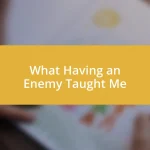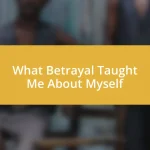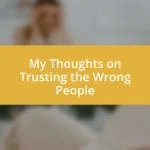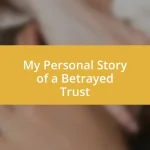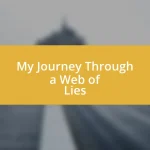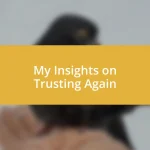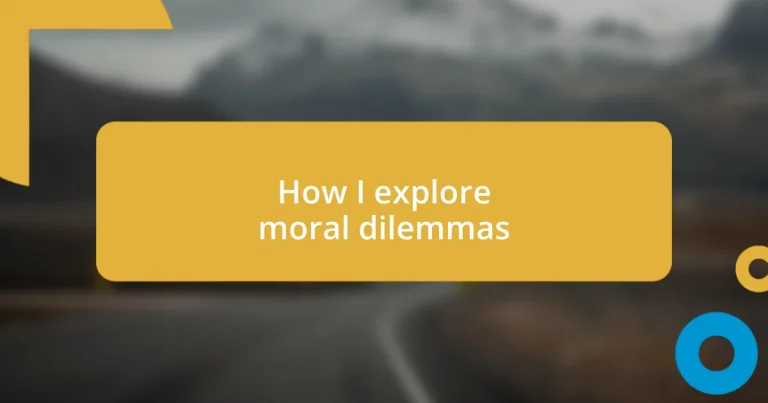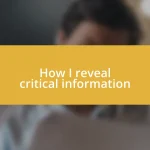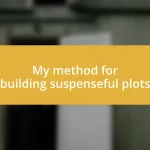Key takeaways:
- Moral dilemmas involve complex choices that require weighing personal values against societal expectations, often leading to emotional conflict.
- Effective analysis of moral dilemmas can involve techniques such as “Pros and Cons” lists, empathy mapping, and ethical frameworks like Utilitarianism and Virtue Ethics.
- Reflecting on past decisions reveals valuable lessons, emphasizing the importance of relationships and the role of intuition in guiding ethical choices.
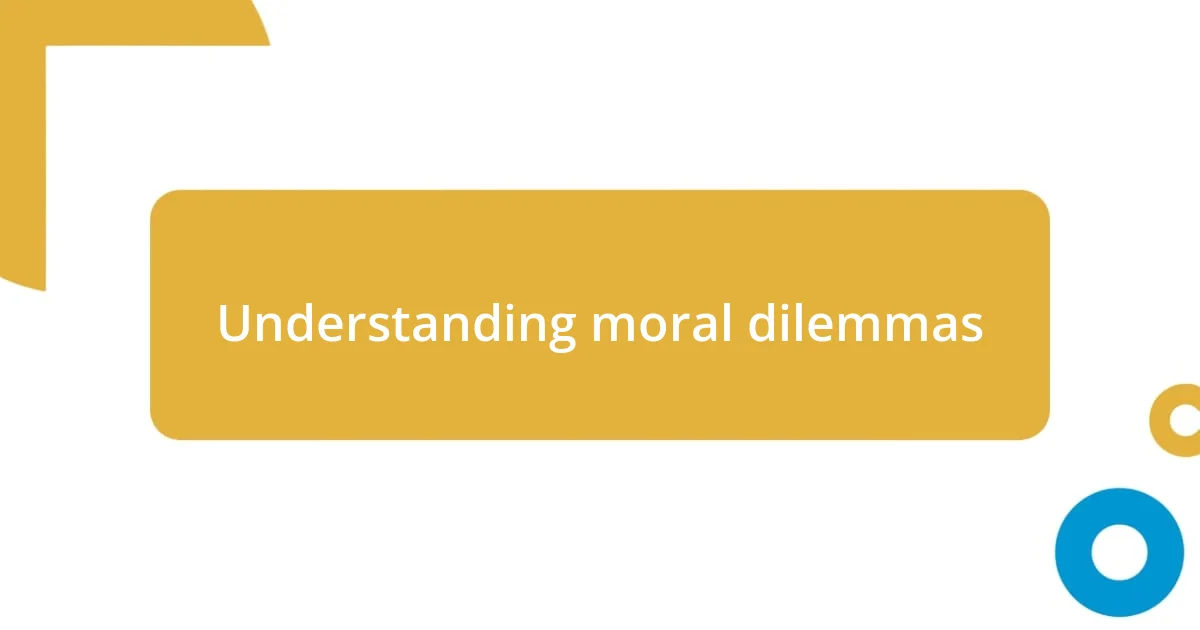
Understanding moral dilemmas
Moral dilemmas often present themselves as complex situations where we face conflicting values or obligations. I remember a time when I had to choose between helping a friend in need and fulfilling my commitments at work. How do we weigh the good of one person against the expectations placed upon us?
These dilemmas can evoke emotional turmoil, leaving us grappling with guilt and uncertainty. I often find myself reflecting on the consequences of my decisions, questioning if I truly made the right choice. Isn’t it fascinating how such moments can feel like a tug-of-war within our very souls?
Ultimately, understanding moral dilemmas involves recognizing that there are no clear-cut answers. Each scenario is unique, shaped by our experiences and beliefs. When faced with tough choices, I’ve learned the importance of taking a step back, evaluating not just the actions, but the motivations behind them. How do you navigate those murky waters where right and wrong seem to blur?
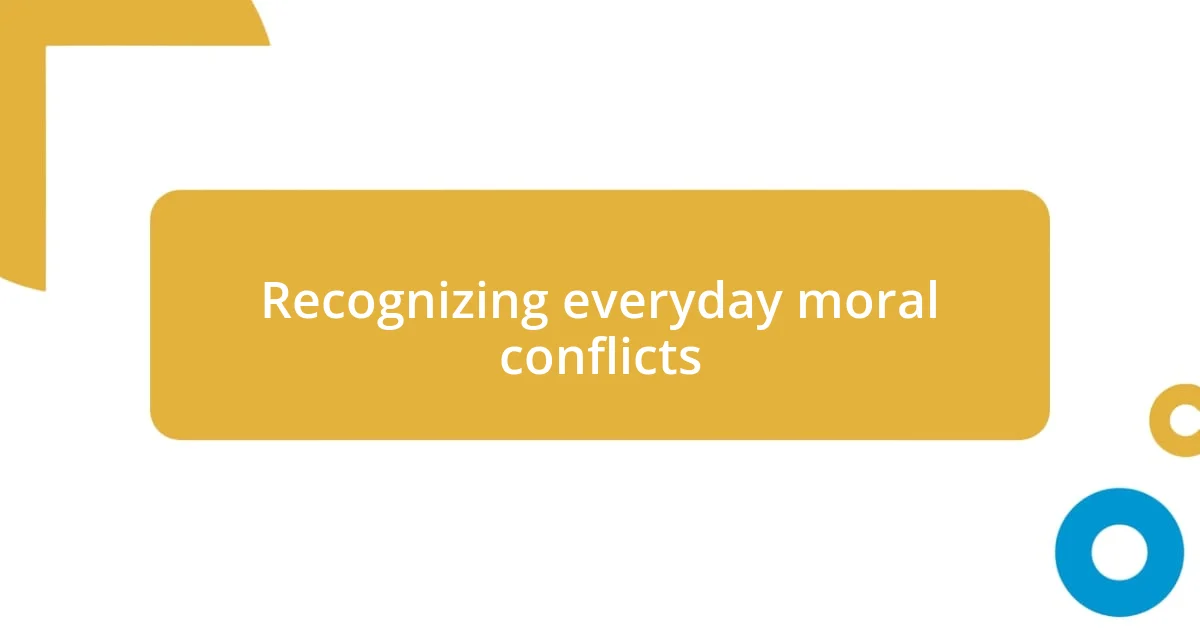
Recognizing everyday moral conflicts
Recognizing everyday moral conflicts often starts with self-awareness. I’ve found that my daily encounters can be riddled with situations demanding ethical judgment. For instance, deciding whether to report a colleague’s misconduct because it might hurt their family while potentially harming others can be a tough call. It raises the question: is it our duty to act, even when we know the consequences could be painful?
In my experience, the smallest interactions can spark significant moral introspection. There was a time when I witnessed a stranger in distress; my instinct was to help but doing so meant risking my safety. I paused, feeling the weight of the decision “To intervene or not?” It’s moments like these that reveal our values and the moral compass we follow, highlighting just how pervasive these dilemmas are in our everyday lives.
Often, I find the conflict arises from competing loyalties—between what feels right and what society expects. For example, I recall a family gathering where a relative made a prejudiced remark. I struggled with whether to speak up and challenge those views, potentially creating tension, or to stay silent and maintain the peace. These scenarios make it clear: moral conflicts are woven into the fabric of our everyday interactions, and recognizing them requires not just awareness, but also the courage to confront them.
| Scenario | Moral Conflict |
|---|---|
| Helping a friend in need | Balancing personal obligations with friendship |
| Reporting a colleague’s misconduct | Personal loyalty versus societal responsibility |
| Intervening in a stranger’s distress | Safety concerns versus moral duty |
| Addressing prejudice at family events | Family harmony versus standing up for what’s right |
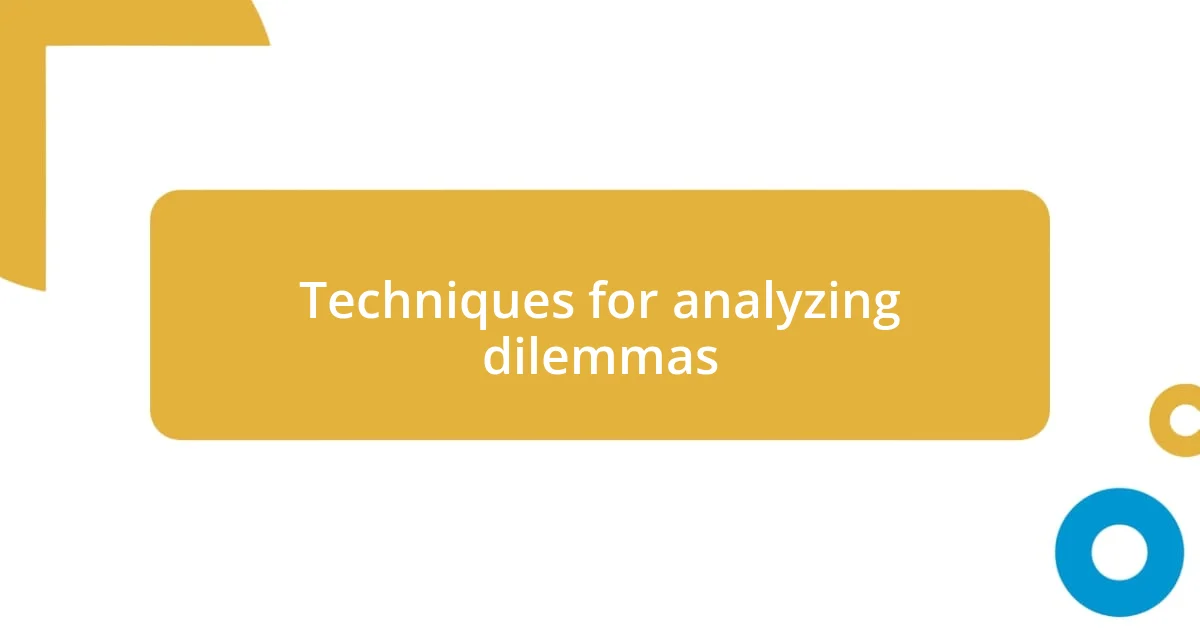
Techniques for analyzing dilemmas
Analyzing moral dilemmas effectively demands a combination of structured thinking and emotional intelligence. One technique I often utilize is the “Pros and Cons” list. It provides tangible insights into the potential outcomes of each decision. For instance, when contemplating whether to help a friend move or stick to prior plans, I jot down how each choice aligns with my values and commitments. This not only clarifies my thoughts but also helps me become conscious of the emotions tied to each option.
Here are a few other techniques I find beneficial:
- Stakeholder Analysis: Identifying who is affected by the decision and how their interests weigh against each other.
- Empathy Mapping: Imagining the perspective of each party involved, fostering deeper understanding of their motivations.
- Hypothetical Scenarios: Envisioning the long-term consequences of each potential decision helps me predict outcomes and adjust my choices accordingly.
- Reflective Journaling: Documenting my thoughts and feelings post-decision aids in processing and learning from the experience.
As I navigate through these steps, I often discover unexpected layers to my dilemmas. I remember a time when I faced the choice of leaving a secure job to pursue a passion project. The decision left me feeling torn, but breaking down my desire for stability versus my yearning for fulfillment illuminated my true values. It was an emotional rollercoaster but ultimately led me to a clearer path.
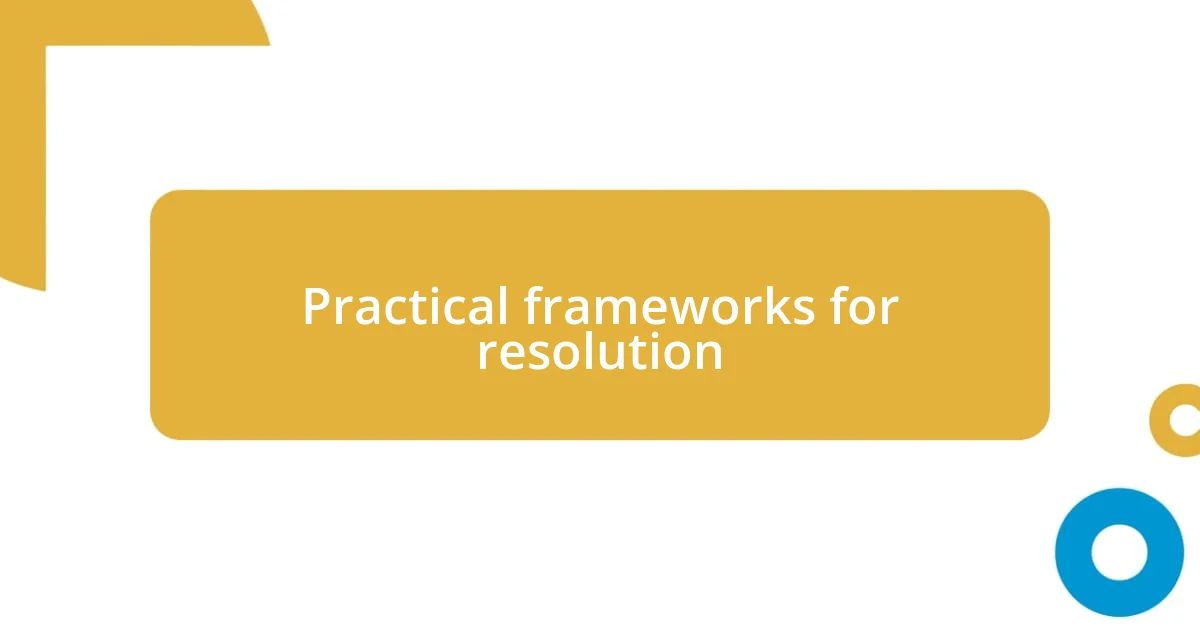
Practical frameworks for resolution
A practical framework I often rely on is the Ethical Decision-Making Model. This involves a step-by-step approach: first, identifying the problem, then exploring the options, considering the consequences, and finally making a choice. I remember grappling with whether to report an ethical breach in a project I was involved with. By following this model, I could delineate my thoughts more clearly, weighing not just the risks but also the benefits of acting with integrity.
Another effective framework is Utilitarianism—essentially, the idea of the greatest good for the greatest number. It offers a lens through which I can evaluate my decisions. Once, I faced a situation where two friends wanted to attend separate events on the same night. I weighed who would benefit most from my presence; this helped me make a choice that honored one friend’s need for support while still maintaining my relationships. This approach invites me to consider the broader impact of my decisions, reminding me that sometimes the best choice isn’t just about personal feelings—it’s about collective wellbeing.
I also appreciate using Virtue Ethics as a framework, focusing on what a person of good character would do. Reflecting on my values, such as honesty and empathy, often guides me through morally murky waters. For instance, navigating a tricky conversation with a family member about financial decisions can be intimidating. I ask myself how my actions align with who I aspire to be, which often steers me toward a more thoughtful and compassionate response. Wouldn’t it be great if we all paused to envision the most virtuous steps we could take in our dilemmas?
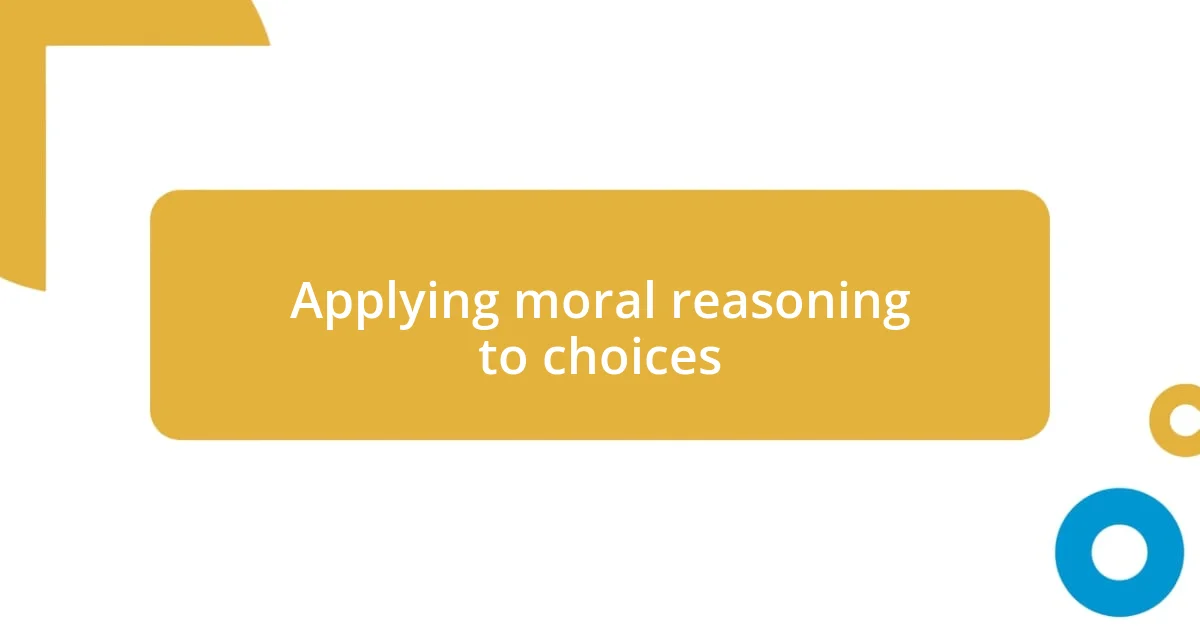
Applying moral reasoning to choices
When I think about applying moral reasoning to choices, I often find myself in a mental tug-of-war. For example, I once needed to pick between attending a friend’s wedding or an important family gathering. Initially, I felt torn, but I realized that mapping out my values—commitment to relationships versus family obligations—helped clarify my priorities. Isn’t it interesting how our decisions can force us to confront what truly matters to us?
Another thing I’ve learned is the impact of framing my choices in a broader context. Suppose I’m deciding whether to support a local business or purchase from a larger chain. I take a moment to reflect on the potential economic implications for my community. This perspective shift often uncovers feelings of responsibility and connection that I hadn’t considered initially. Have you ever felt that sense of belonging push you toward a certain choice?
It’s fascinating how the act of moral reasoning can evoke different emotions as I weigh my options. I recall a time when I had to decide whether to speak up about an unfair practice at work. The anxiety of potentially upsetting my colleagues clashed with my value of integrity. I found myself questioning what kind of impact my silence would have in the long run. Ultimately, embracing that dilemma empowered me to act in alignment with my ethics, proving that navigating these tough choices can lead to personal growth and a clearer moral compass.
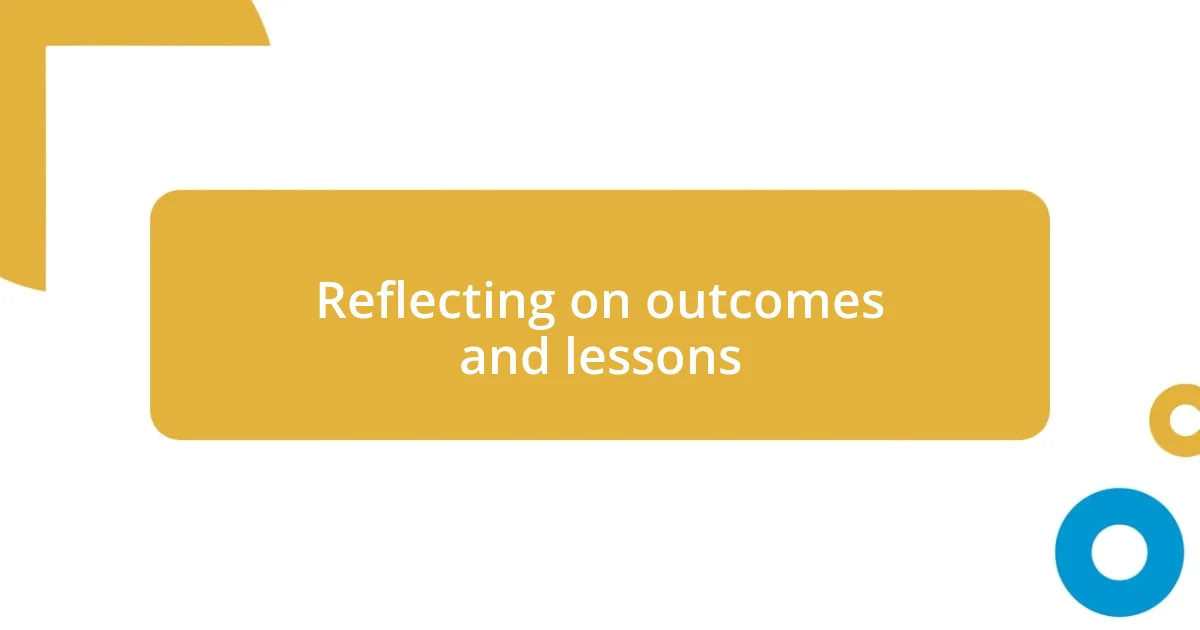
Reflecting on outcomes and lessons
Reflecting on the outcomes of my decisions often unveils unexpected lessons I might never have considered. I once made a choice to prioritize my professional goals over a friend’s needs. Initially, I felt justified, but in retrospect, the rift it caused in our friendship was more costly than I’d imagined. It makes me wonder—how often do we overlook the value of our relationships in pursuit of personal ambition?
One revelation I’ve had through this reflection process is the importance of embracing failure. I remember a time when I launched a project at work that didn’t meet expectations. At first, I felt embarrassed and frustrated. However, by analyzing what went wrong, I discovered invaluable insights about team dynamics and communication. It’s amazing how a seemingly negative outcome can lead to personal growth and future success if we choose to learn from it.
I’ve also learned to trust my intuition during these reflections. When I was torn over whether to intervene in a friend’s unhealthy relationship, my gut told me something was off. Afterward, when I finally spoke up, I felt a wave of relief despite the initial discomfort. This experience reinforced the idea that sometimes, understanding our emotions and instincts can guide us to appropriate actions. Isn’t it fascinating how our internal compass can lead us toward the right path, even when taking that first step feels daunting?

